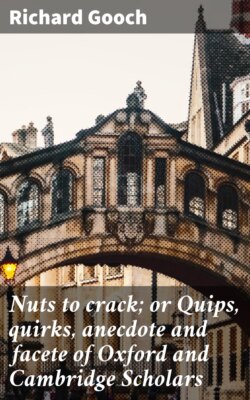Читать книгу Nuts to crack; or Quips, quirks, anecdote and facete of Oxford and Cambridge Scholars - Gooch Richard - Страница 56
На сайте Литреса книга снята с продажи.
COMIC PICTURE OF THE ELECTION OF A PROVOST OF KING’S COLLEGE, CAMBRIDGE.
ОглавлениеUpon the death of a provost of King’s College, Cambridge, the fellows are obliged, according to their statutes, to be shut up in their celebrated chapel till they have agreed upon the election of a successor, a custom not unlike that to which the cardinals are subject at Rome, upon the death of a pope, where not uncommonly some half dozen are brought out dead before an election takes place. “The following is a comic picture of an election,” says Judge Hardinge, in Nichols’s Illustrations of Literature, from the pen of Daniel Wray, Esq. dated from Cambridge, the 19th of January, 1743. “The election of a provost of King’s is over—Dr. George is the man. The fellows went into chapel on Monday, before noon in the morning, as the statute directs. After prayers and sacrament, they began to vote:—22 for George; 16 for Thackery; 10 for Chapman. Thus they continued, scrutinizing and walking about, eating and sleeping; some of them smoking. Still the same numbers for each candidate, till yesterday about noon (for they held that in the forty-eight hours allowed for the election no adjournment could be made,) when the Tories, Chapman’s friends, refusing absolutely to concur with either of the other parties, Thackery’s votes went over to George by agreement, and he was declared. A friend of mine, a curious fellow, tells me he took a survey of his brothers at two o’clock in the morning, and that never was a more curious or a more diverting spectacle: some wrapped in blankets, erect in their stalls like mummies; others asleep on cushions, like so many Gothic tombs. Here a red cap over a wig, there a face lost in the cape of a rug; one blowing a chafing-dish with a surplice-sleeve; another warming a little negus, or sipping Coke upon Littleton, i.e. tent and brandy. Thus did they combat the cold of that frosty night, which has not killed any one of them, to my infinite surprise.” One of the fellows of King’s engaged in this election was Mr. C. Pratt, afterwards Lord High Chancellor of England, and father of the present Marquis of Camden, who, writing to his amiable and learned friend and brother Etonian and Kingsman, Dr. Sneyd Davies, archdeacon of Derby, &c. in the January of the above year, says, “Dear Sneyd we are all busy in the choice of a provost. George and Thackery are the candidates. George has all the power and weight of the Court interest, but I am for Thackery, so that I am at present a patriot, and vehemently declaim against all unstatutable influence. The College are so divided, that your friends the Tories may turn the balance if they will; but, if they should either absent themselves or nominate a third man, Chapman, for example, Thackery will be discomfited. Why are not you a doctor? We could choose you against all opposition. However, I insist upon it, that you shall qualify yourself against the next vacancy, for since you will not come to London, and wear lawn sleeves, you may stay where you are, and be provost,”—which he did not live to be, though he did take his D.D.
